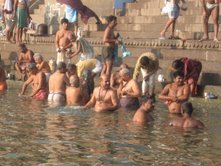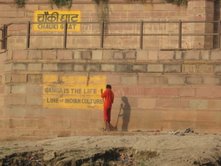



Ganga is the Lifeline of Indian Culture
This tagline was written on the wall of one of the ghats along the Ganga, and I don't have any better words to describe how this river permeates the life of the city of Varanasi or India as a whole.
Varanasi (Benaras--like most cities in India, it has two names with several spelling options) is old, holy, historic, crumbling to bits and incredibly beautiful in its shabbiness. It has an atmosphere and aura unlike any other Indian city I've been to, perhaps because of the seamless blend of the energy of life and the acceptance of death. Saturday morning I took a boat ride at sunrise down the Ganga and watched the ghats come alive with men, women and children bathing, drinking, swimming, praying and washing their clothes in the Mother Ganga. The main ghat of the city is Dasashwadmedh and it's teeming with people and radiating with the dawning of life.
Shortly after passing by this ghat, the shift in energy is palpable as you approach Manikarnika ghat, the main burning ghat for cremation. Early morning chatter gives way to barking dogs and the crackling of burning wood. There wasn't a feeling of deep sadness, despair or morbidity, just an eerie quiet. You can sense the people who come there have a quiet acceptance of rather than resignation to the inevitable end of the mortal body. Ashrams and houses near the ghat are filled with people who came to Varanasi, the chosen home of Lord Shiva, to die. Those who die in Varanasi are guaranteed moksha, liberation from the cycle of death and life. Some are prepared with enough money for the cremation ceremony. Others are scraping together rupees while they wait to pass on. Those who cannot afford the cremation ceremony are wrappend in white sheets and dumped whole into the river. Several of these dead bodies can be seen floating nearby and bobbing in the water. My boat actually collided with one, merely eliciting a smile and a shrug from my boatman and a giggle from his ten-year-old son.
The coexistence of energy and inspiration with the acceptance and desire for death on the banks of the Ganga remind me of a passage I read in Gita Mehta's Karma Cola, a satirical look at the collison of the West and the East in India. She was talking to a Swiss national living in India about why he chose India over his home country. In part of his reply, he said, "It is here a noisy, dirty silence. So many millions being born, living, dying, without the fuss. This I appreciate. So little fuss. We Swiss are supposed to like order. Well, this is order because in India, you are always reminded of the significance and insignificance of life."

0 Comments:
Post a Comment
<< Home